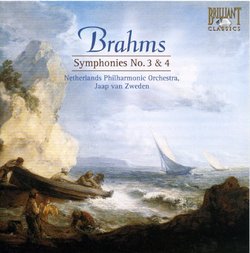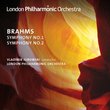| All Artists: . Title: Brahms: Symphonies No. 3 & 4 Members Wishing: 0 Total Copies: 0 Label: Brilliant Classics Original Release Date: 1/1/2009 Re-Release Date: 4/21/2009 Genre: Classical Styles: Chamber Music, Historical Periods, Classical (c.1770-1830), Symphonies Number of Discs: 1 SwapaCD Credits: 1 UPC: 842977032468 |
Search - . :: Brahms: Symphonies No. 3 & 4
 | . Brahms: Symphonies No. 3 & 4 Genre: Classical
|
Larger Image |
CD DetailsSimilar CDs |
CD ReviewsA rising Dutch conductor shows his abilities in Brahms on a Santa Fe Listener | Santa Fe, NM USA | 04/25/2010 (4 out of 5 stars) "Jaap van Sweden, not yet forty, has a remarkable career trajectory. After studying violin under Dorothy De Lay at Juilliard, he became the youngest-ever concertmaster of the Royal Concertgebouw at 19. He gave up that post sixteen years later to become a conductor full time. This recording, part of a complete Brahms cycle, is with his own Netherlands Phil., but he has also taken over the Dallas Sym. as of 2008. Everywhere he goes, van Zweden seems to impress people, including the musicians who play under him. Is he a second Haitink or Harnoncourt in the making, both of whom began as orchestral musicians?
One can tell immediately that van Zweden is the real thing. The Brahms Third is direct and natural, with "swing" in the phrasing and expressive flexibility. He doesn't reach deeper for refinement and nuance the way Rattle and Karajan do, but the young Haitink was equally direct and equally successful in Brahms -- see is first cycle with the Concertgebouw on Philips. I may be reading between the lines, but the musicians here seem to be feeling the music; they certainly blossom under the conductor's leadership in any case. the whole style is flowing rather than rugged, but if you compare van Zweden with a recent pairing of the Brahms First and Second under Vladimir Jurowski (on the house label of the London Phil.), the latter's attempt at lyrical flow comes off as bland and superficial while the former is able to add real intensity to the line. Tempos are conventional throughout, and the recorded sound is good if nothing special. I found the two inner movements a bit straightforward but liked the robust, forward-moving finale quite well. Arriving at the Fourth, my only complaint was a certain tendency to hover near mezzo forte rather than exploring the softer dynamics and a sense that the orchestra, for all its enthusiasm, wasn't really top notch. Not that a bit of roughness hurts Brahms. Van Zweden doesn't seem to consider that the Fourth has a particular personality that's different form the Third, and so we get the same direct, robust, naturally expressive style. One notices no mincing around with the opening theme of the first movement, no attempt at applied pathos. But at the same time, the second theme isn't allowed the heroic contrast that it receives under the greatest conductors. Furtwangler's monumentality and Bernstein's tragic atmosphere aren't conjured up here. Still, van Zweden's Brahms is strong-limbed and on an ambitious scale. This Fourth winds up with a finale where he fails to explore the individuality of each variation, and that's a major drawback. But van Zweden kept the momentum going form first bar to last, and I imagine in concert that the audience would be on its feet the instant the last chord died away." |

 Track Listings (8) - Disc #1
Track Listings (8) - Disc #1![Beethoven: Symphonies Nos. 1 & 5 [Hybrid SACD]](https://nationalbookswap.com/cd//m/88/9688/6179688.jpg)

